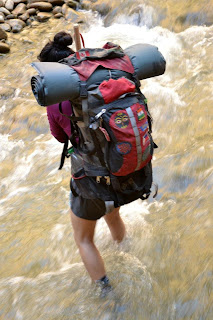It great to see beginner backpackers first experience the joys of backcountry camping. Unfortunately, I've seen them do too many mistakes that would have been easy to avoid, had they gotten a proper intro lesson. Here is my main list of Dos and Don'ts for beginner backpackers.
 DON'T invest a lot of money into gear
DON'T invest a lot of money into gear
Especially if
this might only be a once-in a while thing and you don't plan on going backpacking every season. You can
rent everything you need, e.g. a backpack or stove, for a whole weekend
from stores such as Sport Chalet at a tenth of the cost of buying gear. (If you go backpacking once a year for 10 years, renting is still the cheaper option!)
Or ask around if anyone has extra gear that you could borrow.
DON'T wear heavy hiking boots
If the trail is well maintained, the distance of your first backpacking trip probably won't be long enough to really strain your ankle. You could
wear the same shoes you would wear on a dayhike unless your ankles are prone to injury or your backpack is insanely heavy (but if this is the case, you're probably doing something else wrong..! See my next four points).
DON'T bring heavy jars or cans or too many fresh,
juicy fruits and vegetables
One or two fruits are fine, but leave these behind in favour of things like
dried fruits, trail mix, and calorie-dense foods such as cookies,
crackers, bread and chocolate. I normally eat really healthy, but
backpacking is where you really want to save on weight, plus you can
survive for a day without fresh fruits and veggies anyway! I'd carry max a few carrots.
 DO repack foods
DO repack foods
Measure out single-serving portions of
cereal, cheese, etc. into ziplock baggies. The biggest no-nos I'd seen
were glass jars of peanut butter and nutella where you only use 1
spoonful.
DO bring easy-to-cook or no-cook meals
If you like a warm meal, "instant" foods are great, e.g. noodle soup
where you just add boiling water, or the packets of Indian curries that
you just heat up and eat with pita bread. Oh, and hummus and pita always tastes
great! But really plan out what's for breakfast, lunch and dinner, otherwise you'll be carrying a lot of extra weight back.
DO pack light
This will largely depend on the weight of your
"big 3", the backpack, tent and sleeping bag. But other than those,
really you only need to bring food stuffs, toiletries (again, repack... think travel-size!), a warm
sweater for the night and a single change of clothes. Skip the comforts you would normally carry while
car camping, e.g. books, camping chair or games. I bring a warm sweater but
leave my jacket because if I get cold, I can just bundle up in my
sleeping bag. :) Other tips: bring a plastic teaspoon instead of a metal tablespoon; bring a metal mug that can be re-purposed as a cooking pot and a food bowl... you get the idea.
DO bring enough water and/or a water filtration
method
Find out if there are any springs along the trail. If there are, bring less water and filter/sterilize along the way. Iodine is cheap but sometimes inconvenient. A water filtration system can be expensive, so try to find out if anyone in the group is bringing a water filter to share.
DO pack your backpack according to an ideal weight distribution
Light stuff goes on the bottom (sleeping bag), heavy stuff on top and as close to your back as possible. You can tie your foam sleeping pad on the outside. Last but not least, when you start the trip, ask someone to check whether your straps are properly tightened. Most of the weight should be on your hips, not on your shoulders.
Coming soon I'll post a basic packing list, and also give you a glimpse into what I pack in my own backpack. Do you have any other tips to share? Post in the comments!











